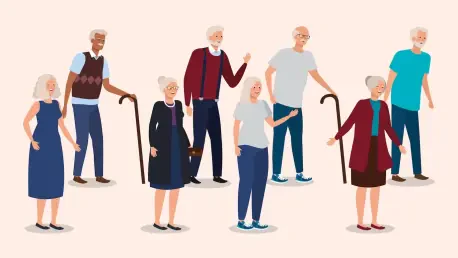When discussing the intricacies of policy and legislation, few voices carry the weight and experience of Donald Gainsborough. As a political savant and leader at Government Curated, Gainsborough possesses an in-depth understanding of the legislative needs impacting today’s society. In our conversation, we delve into the pressing topic of Georgia’s aging population and the legislative actions, particularly House Bill 238, aimed at better serving this growing community. Gainsborough reflects on the necessary measures and potential implications for Georgia, exploring both successful initiatives and challenges faced in the current lawmaking landscape.
What prompted the introduction of House Bill 238, and why is it considered necessary for Georgia’s aging population?
The introduction of House Bill 238 was driven by the rapid increase in Georgia’s senior population. The data clearly shows that seniors are becoming a significant part of the community, especially in areas like North Georgia mountains and coastal regions. With this growth comes a rise in cognitive decline cases, necessitating a legislative priority to prepare officers to effectively respond to vulnerable seniors who may face challenges like memory loss and confusion during police intervention.
Can you explain the expected impact of the growing number of seniors on Georgia’s communities?
As the population over 65 increases, Georgia’s communities will face a transformative shift in demographics. We’re looking at changes in healthcare needs, housing, and community support systems that cater to seniors. The growing number could mean an amplified demand for senior-focused services, including medical care, social support, and emergency response units equipped to handle specific issues associated with aging, such as Alzheimer’s and dementia.
How do the Alzheimer’s Association and Georgia Council on Aging envision the new training helping officers during calls involving seniors?
Both the Alzheimer’s Association and the Georgia Council on Aging see this training as a crucial tool for officers. The goal is for police to have the expertise to recognize signs of cognitive impairment, thereby enabling them to approach situations involving seniors with sensitivity and understanding. It’s about equipping officers with the knowledge to de-escalate issues calmly and resolve matters effectively to avoid exacerbating confusion or distress among affected seniors.
Can you describe a scenario where improved police response might be needed for a person experiencing cognitive decline?
Imagine a scenario where a senior goes out to a familiar store but suddenly becomes disoriented, forgetting her purpose and location. If she appears agitated or scared, miscommunication might arise with strangers attempting to help, leading to a police call. Improved police response would involve recognizing such symptoms quickly, calming her down, ensuring her safety, and helping her reunite with family or caregivers, thereby mitigating the situation calmly and effectively.
Could you elaborate on the relationship between cognitive decline and the tendency to wander?
Wandering is a prevalent issue among individuals experiencing cognitive decline, with an estimated 60% of seniors with dementia doing so at least once. This tendency stems from confusion and memory loss, causing them to roam without a clear direction, putting them at risk of injury or getting lost. Legislation like HB 238 aims to prepare officers to handle such incidents with understanding and care, thus preventing potential harm.
What specific elements will the training course at the Georgia Public Safety Training Center include concerning at-risk adults with dementia?
The training course will focus on equipping officers with skills to identify signs of dementia and other degenerative diseases. It will include strategies for effective communication, de-escalation techniques, and case-based scenarios to prepare officers in handling real-life situations. The program emphasizes understanding cognitive challenges and the behaviors often associated with such conditions, enabling officers to respond supportively and respectfully.
How does current Crisis Intervention Training (CIT) prepare officers for situations involving persons with emotional disturbances, and how will the new proposed training build on it?
Current CIT offers officers foundational knowledge and practice in handling calls involving emotionally disturbed individuals, emphasizing de-escalation and situational stability. The new training under HB 238 will expand on these principles, tailoring them specifically to seniors with cognitive decline, and adding layers to help officers not only respond but also understand the unique needs that come with aging-related issues.
What are the logistical aspects of integrating this new training module into existing programs at the Georgia Public Safety Training Center?
Integrating the new module involves logistics such as curriculum development, instructor training, and the establishment of a standardized program within the Georgia Public Safety Training Center. It also requires coordination to align this training with existing resources and schedules while ensuring comprehensive outreach to officers statewide. The goal is to seamlessly integrate specialized training without interrupting existing officer education regimes.
Besides HB 238, were there any other notable legislative efforts focused on supporting Georgia’s aging population this session?
Despite HB 238 being at the forefront, there were attempts like the proposal for the Georgia Adult and Aging Services Board and resolutions for including caregiving under Georgia Pathways. However, these faced challenges in passing due to various legislative hurdles. Nonetheless, these efforts highlight an increasing awareness within the legislature about the needs and support structures necessary for an aging population.
Why do you think the proposed Georgia Adult and Aging Services Board failed to pass, and what impact might its absence have on aging services?
The failure of the Georgia Adult and Aging Services Board can be attributed to logistical and administrative challenges in getting approval, which often plague new proposals. Its absence means missing out on a dedicated body to oversee and coordinate aging services, potentially leaving gaps in how these services are organized and delivered across communities, which would have been instrumental in shaping responsive policy and programs.
How would the suggestion to include caregiving under Georgia Pathways have benefited caregivers and the elderly, and why didn’t it advance?
Including caregiving as a qualifying activity under Georgia Pathways would have expanded support for caregivers, improving financial and educational access, which is crucial given their vital role. Unfortunately, it failed to advance due to legislative roadblocks and priority shifts, leaving caregivers and the elderly without potentially transformative benefits aimed at alleviating caregiving burdens.
What can be done to increase awareness and support for legislation that benefits the aging population in Georgia?
Increasing awareness calls for proactive community engagement, utilizing data-driven insights to highlight the growing needs of seniors. Advocacy through partnerships with health organizations, outreach programs, and collaborative initiatives with lawmakers can elevate the discourse. Informing both the public and lawmakers about the crucial role such legislation plays will garner support and advance beneficial policies for Georgia’s aging population.









